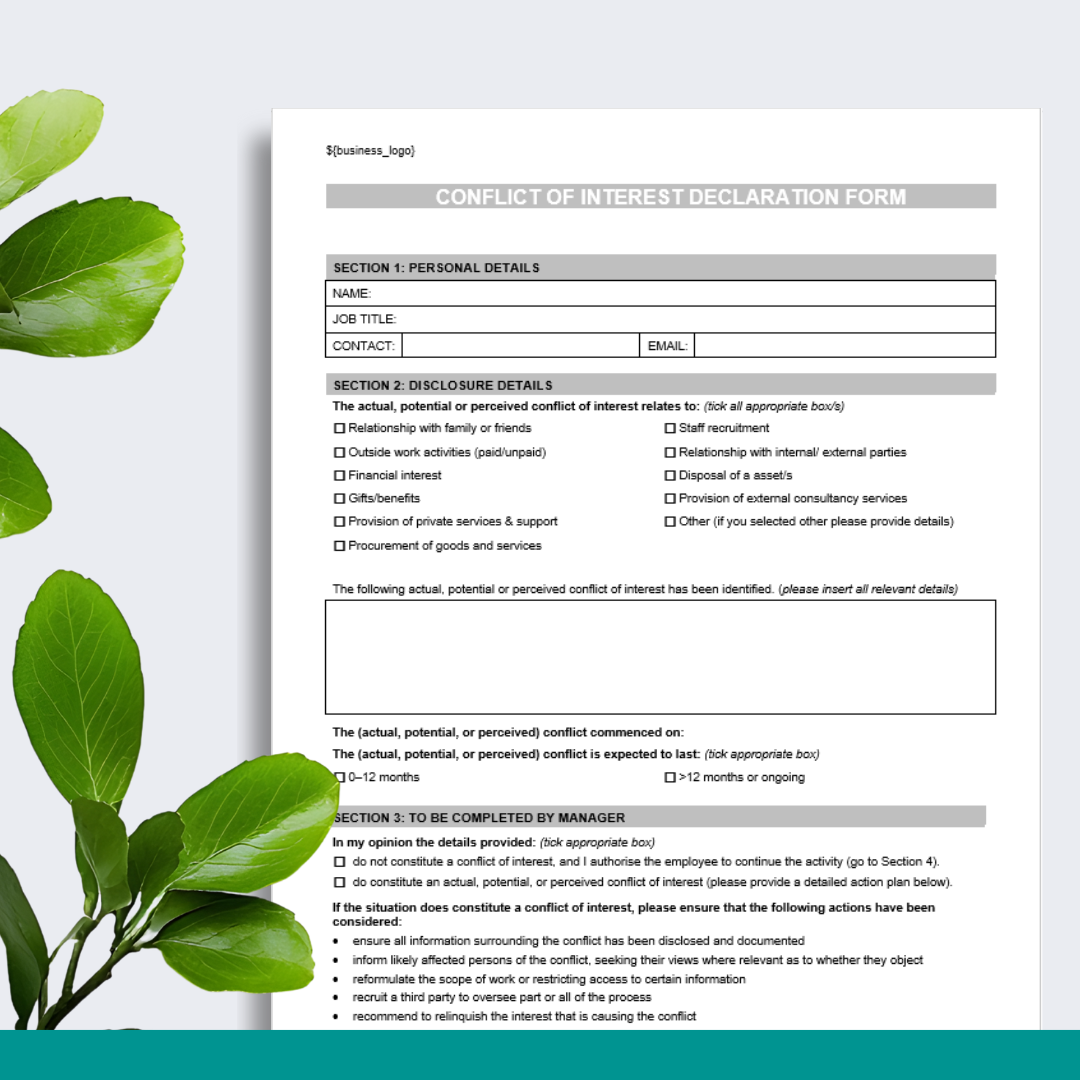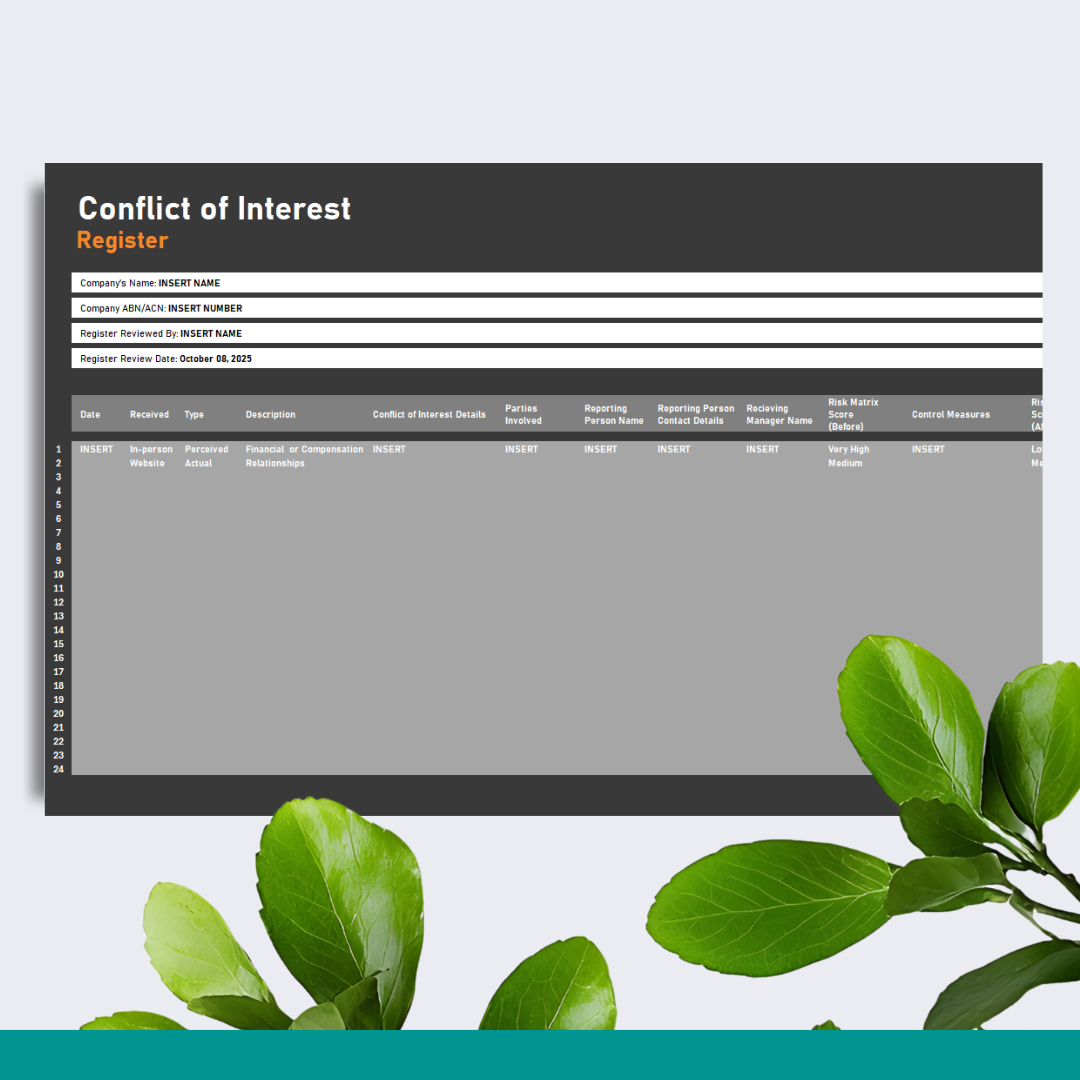Just Released - Conflict of Interest Policy & Procedure
Jumping into 2025, the DCA team has been hard at work delivering value for our customers.
We have just released two brand-new resources:
- Conflict of Interest Policy
- Conflict of Interest Procedure
These new resources complement our existing Conflict of Interest Register.
If you're a subscribed member, you should see these new resources in your member's area now.
What is a Conflict of Interest?
A conflict of interest is a situation when a person/employee and/or an organisation, business or service is involved in a situation where there working against each other and/or compromising a judgment, decision, self-interest, professional interest or public interest in the workplace, consequently resulting in a personal, financially, social, relationship, organisational and so risk.
A conflict to interest interactions could be between but not limited to:
- Service Provider vs Service Provider
- Person vs Person
- Person vs Service Provider
- B2B
Types of Conflict of Interest
Actual Conflict of Interest - Arises where there is a real-time or physical material conflict exists.
Potential Conflict of Interest - Arises where an actual conflict of interest may occur sometime in the future, either based on current circumstances or a change in circumstances.
Perceived Conflict of Interest - Arises where a form of view regarding a conflict of interest exists. The situation appears to be an undermined conflict of interest, even if, in fact, there is no conflict of interest, or it has been resolved already.
COI EXAMPLES
- Hiring an unqualified relative to provide services for your company needs
- Starting a company that provides services like your employer
- Failing to disclose that you’re related to a job candidate the company is considering hiring
- Making arrangements to work for a vendor or client at a future date whilst employed with a current employer
- Posting to social media about a company’s weaknesses
- Offering paid services on your time off to a employer’s customer or supplier
- Working at another company that sells a competing product or service as your employer
- Accepting payment from another company for information or favours.
- Failing to investigate a subordinate or coworker’s wrongdoing because they are a friend
- Sharing confidential information about your employer with a competitor
- Dating or having a romantic relationship with a supervisor or subordinate
- Making a purchase or business choice to boost a business that you have a stake in
- Accepting a favours or a gifts
- Owning part of a business that sells goods or services to your employer
- Reporting to a supervisor who is also a close friend or family member
- Doing business or work for a competitor
- Accepting consulting fees and providing advice to another company for personal gain
- Sharing information about your employer’s activities or plans
- Taking advantage of confidential information learned on the job for your own benefit
- Cashing in on a business opportunity that your company might have pursued
How do you Implement this into your Service?
All employees
Employees have an obligation to conduct business within Policies and Procedures that prohibit actual, potential or perceived conflicts of interest. Given the extremely broad nature of this area, they are expected to and you should always promote an environment where they can seek out guidance and clarification from your Line Manager for interpretation of ANY AND ALL possible conflict of interest situations before entering into arrangements. Employees will declare conflicts by completing but not limited to the Conflict-of-Interest Declaration Form and submitting their Line Manager within 24hrs of identifying an actual, potential or perceived conflict of interest. Employees are responsible for but not limited to the following:
- Reporting and responding to conflict of interest
- Taking immediate action as required to ensure the immediate safety and wellbeing of clients and others
- Obtaining sufficient information to establish the nature of the conflict of interest and those involved
- Notifying the Line Manager as soon as is practicable
- Completing reports as required such as Conflict of Interest Declaration Form
- Cooperating with any investigations
- Participating in debriefing or associated requirements as requested by Management
Owner & Management
Managers or delegate are responsible to receive, investigate and control the conflict. It is also the responsibility to notify any relevant authorities or stakeholders during or after an investigation. Owners, management or delegate/s are responsible for but not limited to the following:
- Launching an immediate investigation and evidence collection upon identification.
- Notifying the relevant statutory agencies, including the Police, NDIS Quality and Safeguards Commission and or Department of Child Safety, Youth and Women or as required within the applicable timeframes
- Liaising with statutory agencies, including as needed.
- Following up on the investigation
- Providing appropriate support to those involved, i.e., debriefing, EAP
- Completing reports as required, i.e., Critical Incidents Forms and CONFLICT OF Interest Register.



